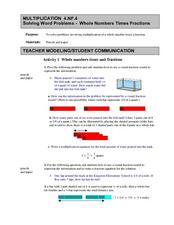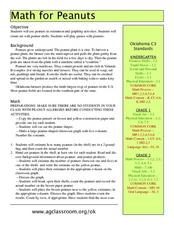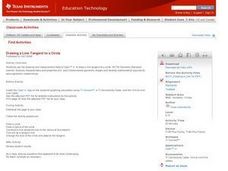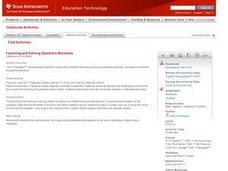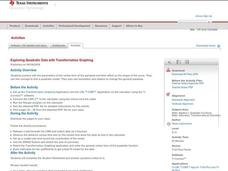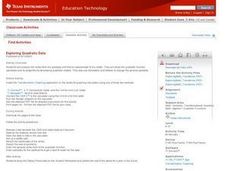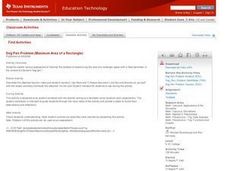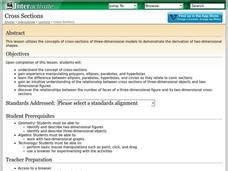Illustrative Mathematics
Fundraising
In order to solve for who raised the most money, learners will need to choose an appropriate math strategy or tool to help them. Two possible solutions, one involving pictures and one involving abstract thought, are presented in the...
Illustrative Mathematics
Converting Fractions of a Unit into a Smaller Unit
There is more than one way to answer a question; especially when you have fractions in measurement. Here are three questions with real-world situations in which 5th graders are asked to provide answers in three ways: a larger unit of...
Illustrative Mathematics
Salad Dressing
Aunt Barb's salad dressing is a mixture of oil, vinegar, salt, herbs, and a pinch of math. Fifth graders add the fractional measurements of ingredients to find a total amount. The fractions have unlike denominators. After finding the...
Howard Hughes Medical Institute
Color Variation over Time in Rock Pocket Mouse Populations
A species-specific look at natural selection, the resource herein examines how adaptations have helped the population of rock pocket mice survive in a changing landscape. To begin, middle or high schoolers watch a 10.5 minute video,...
Fraction Bars
Solving Word Problems - Whole Numbers Times Fractions
An impressive lesson where pupils visualize models and solve problems involving multiplying a whole number times a fraction. Fraction bars are used to help learners truly understand what's happening during this mathematical process. The...
Oklahoma State University
Math for Peanuts
Peanuts! Get your peanuts! Kids explore math, art, and agriculture concepts focused on peanuts. There is a brief informational text to get them started, and you'll find definitions of five in-text vocabulary words to address. Kids...
Illustrative Mathematics
Building toward fluency
Here is a great learning task that focuses on the development of areas in computational fluency including strategies in mental math. Young learners are guided through a list of addition expressions that help them visually understand the...
Illustrative Mathematics
Checking a calculation of a decimal exponent
In a writing prompt, learners are asked to check the calculation of a decimal exponent without a calculator. Use as an opener or assessment after studying fractional exponents. Requires a strong understanding of exponents and roots to...
Google
Surveys and Estimating Large Quantities
Looking for an estimation activity a bit more involved than the typical "guess the number of jellybeans in the jar" game? Here, learners use a picture to estimate the number of people at a large event, look for potential problems with...
Google
The Law of Large Numbers and Probability
Learners investigate why theoretical probability doesn't always match reality. The activity involves using Python 2.7 (or Sage) to set up a Bernoulli Trial. It also involves setting up a spreadsheet to simulate the Birthday Paradox....
Texas Instruments
Drawing a Line Tangent to a Circle
Explore lines tangent to a circle. In this math lesson, high schoolers manipulate circles and lines on a TI calculator. They draw a circle and analyze perpendicular lines intersecting the circle in only one place. This activity works...
Curated OER
Special Right Triangles
Using the Pythagorean Theorem to solve for missing angles, young scholars evaluate right triangles and their properties.
Curated OER
Quadratic Equations
Using the provided worksheets, students solve equations involving factoring and finding square roots. At the conclusion of the lesson, they discuss the answers and any difficulty experienced in solving the equations.
Texas Instruments
Factoring and Solving Quadratic Binomials
Here is a TI-Navigator™ activity that allows students to review the concept of factoring and solving quadratic binomials, including a connection to graphical solutions. They enter a number such as -2 using the minus key and not the...
Curated OER
Exploring Quadratic Data with Transformation Graphing
Using a data collection device to collect data regarding a bouncing ball, students use various features on graphing calculators to experiment with the parameters of the vertex form of the parabola and their effect on the shape of the...
Curated OER
Exploring Quadratic Data : Transformation Graphing
High schoolers analyze the vertex form of a parabola and find an approximate fit of a model. They explain the quadratic parabola function and its properties by developing quadratic models. They use translation and dilation to change the...
Curated OER
Dog Pen Problem
Teach your class about various approaches to solving the problem of maximizing the area of a rectangle space with a fixed perimeter in the context of a farmer's dog pen. Then, they complete a worksheet independently to summarize the...
Curated OER
Powers and Roots of Complex Numbers
Explore a few powers of complex numbers numerically and decide if there is a pattern and use parametric equations to represent a complex number graphically. Use De Moivre's theorem to represent the roots of the complex number...
Curated OER
Rational Functions
Through a mini assessment, learners identify and list the vertical and horizontal asymptotes for the given rational functions and determine the type of asymptote of a given rational function. They also decide which form of a function...
Curated OER
Vernier - A Speedy Slide with EasyData™ App and CBR 2™
Mathematicians use a CBR 2™ motion detector to determine their speed or velocity going down a playground slide. They also experiment with different ways to increase their speed going down the slide. Finally, learners complete the Student...
Shodor Education Foundation
Cross Sections
Use this activity on cross-sections of three-dimensional shapes in your math class to work on algebra or geometry Common Core standards. The instructional activity includes a list of relevent terminology, and a step-by-step process to...
Montana Office of Public Instruction
Native American Culture: Counting, 1:1 Correspondence
Kindergarteners practice showing 1:1 correspondence while incorporating information they learned about a local Native American culture. The objects used for counting are taken from the previous day's Native American lesson. The intention...
DK Publishing
Finding 5 - Multiplying by 5
Visualize multiplication facts using rectangular arrays. Scholars multiply single-digit factors by five and represent each number sentence using sets of dots. They circle the groups of five and fill in missing parts of the equations....
Curated OER
The Pythagorean Theorem and Classifying Triangles
Through the examination of the relationship between the lengths of the sides of a triangles high schoolers will learn the classification of triangles (acute, right, or obtuse).






